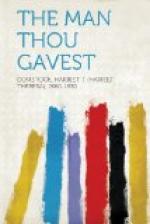A sharp pause caused Truedale to turn and look at Lynda.
“And—now?” he asked.
“Con, Nella-Rose died last year!”
The stillness in the room pressed close; even the clock’s ticking was unnoticed. The spark upon the hearth had become a flame; it had found something upon which to feed. Like a radiant hope it rose, faded, then leaped higher among the white ashes.
“She went, Con, like a child tired of its play. She was with Lois Ann; it was the hill-fever, and she was mercifully spared the knowledge of suffering or—renunciation. She kept repeating that she saw beautiful things; she was glad—glad to the last minute. Her children and husband have gone to Nella-Rose’s old home. Lois Ann says they are saving everybody! That’s all, Con—all.”
Then Truedale, his eyes dim but undaunted, leaned and drew Lynda up until, kneeling before him, her hands upon his shoulders, they faced each other.
“And this is the way women—save men!” he said.
“It is the way they try to save—themselves,” Lynda replied.
“Oh, Con, Con, when will our men learn that it is the one life, the one great love that we women want?—the full knowledge and—responsibility?”
“My darling!” Truedale kissed the tender mouth. Then drawing her close, he asked:
“Do you remember that day in Thornton’s studio—and his words? Looking back at my life, I cannot understand—I may never understand—what the Creator meant, but I do know that it was all in the clay!”
Lynda drew away—her hands still holding him. Her brave smile was softening her pale face.
“Oh! the dear, dear clay!” she whispered. “The clay that has been pressed and moulded—how I love it. I also do not understand, Con, but this I know: the Master never lost the vision in the clay.”



